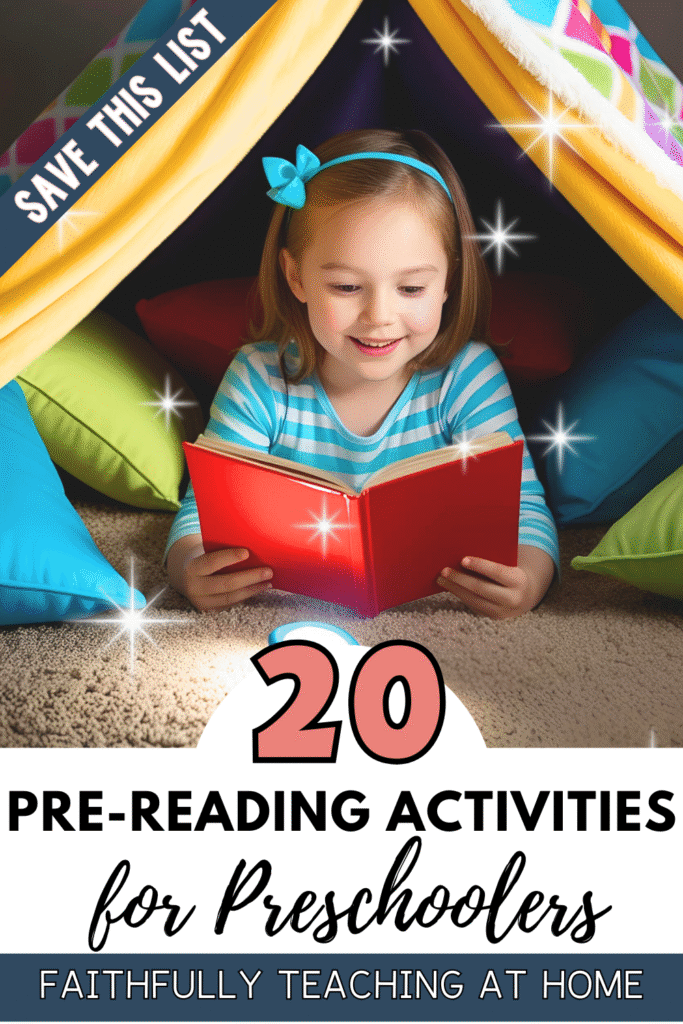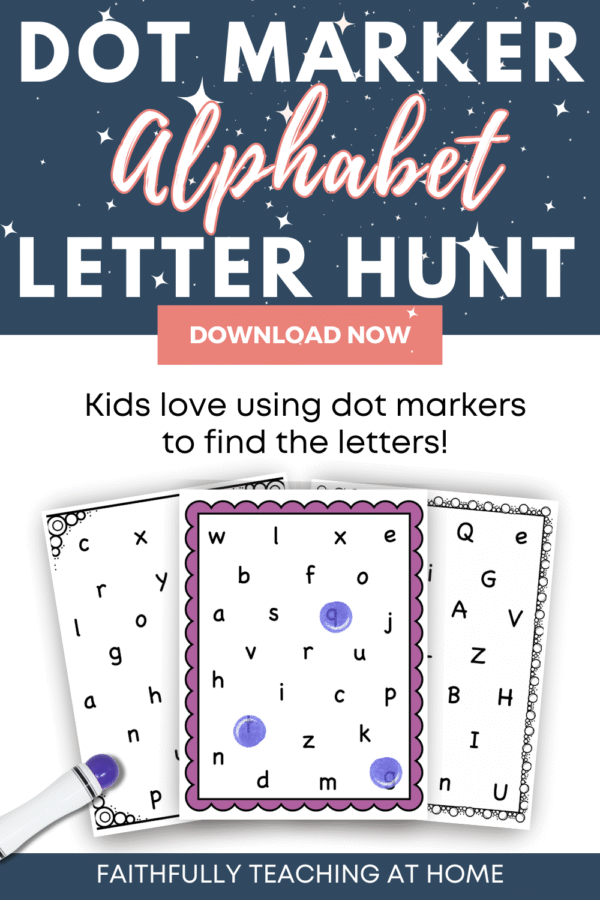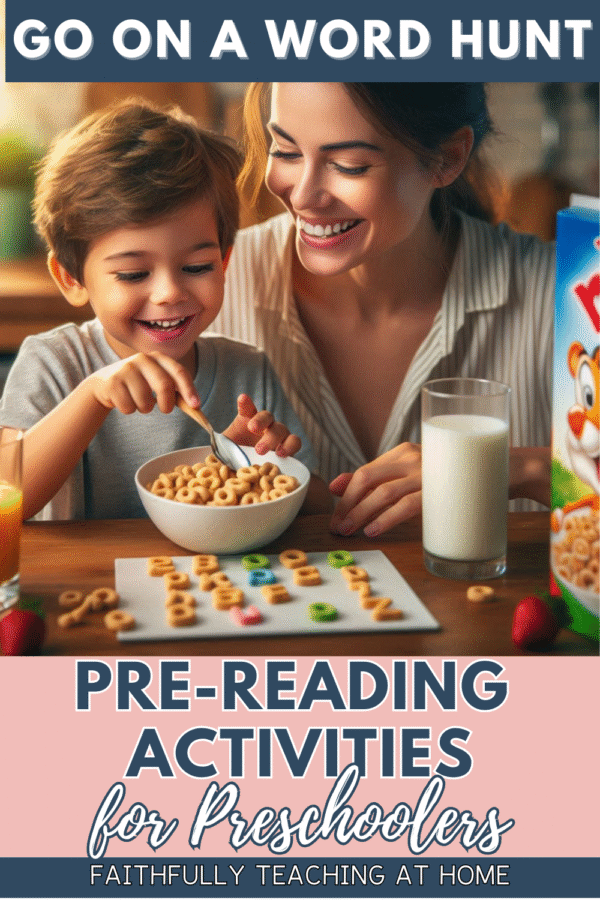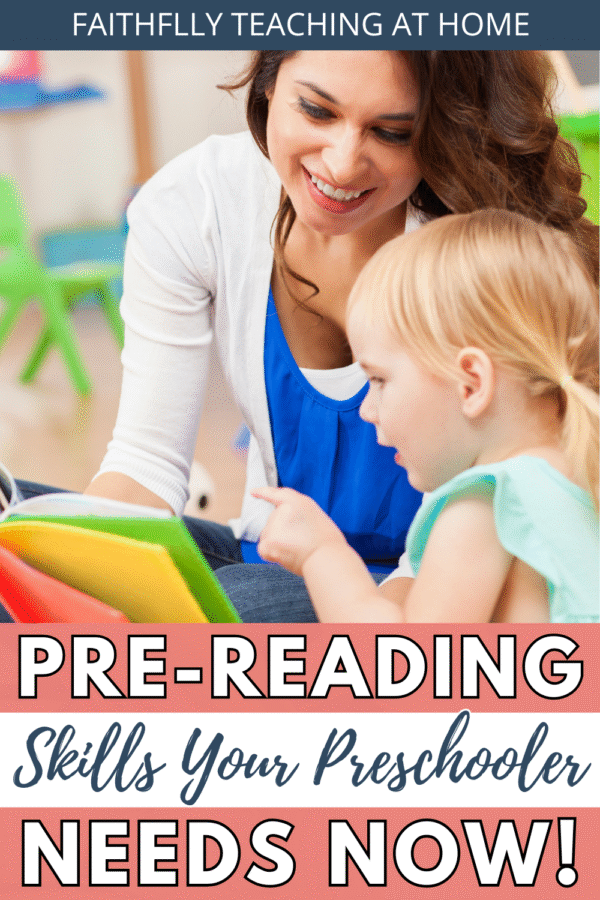
Pre-Reading Activities for Preschoolers: Easy and fun ideas to build early literacy
Let’s be honest—finding the right pre-reading activities for preschoolers can feel a little overwhelming, especially when you’re trying to keep things fun and not fall into a worksheet rut.
But here’s the good news: most pre-reading activities can be done through everyday moments, play, and engaging activities. You don’t need a classroom or a degree in early childhood education to help your preschooler get ready to read. You just need a few simple, fun ideas that fit right into your daily routine.
So I have gathered together some fun and engaging pre-reading activities for preschoolers that are easy to do in your home.
What are the Best Pre-Reading Activities for Preschoolers?
Always make pre-reading activities for preschoolers playful! Preschoolers learn best when they’re moving, exploring, and having fun. That means ditching the pressure and focusing on pre-reading activities for preschoolers that are engaging and hands-on. Your goal isn’t to push them to read early—it’s to lay a strong foundation that makes reading easier when they’re ready.
Here are some fun, screen-free pre-reading activities for preschoolers:
20 Pre-Reading Activities for Preschoolers

1
Read aloud every day
This one’s a no-brainer, but it really is *that* important. Read in silly voices, ask questions, point to pictures—make it an experience! Daily reading builds vocabulary, comprehension, and a love for books.
2
Play with Magnetic Letters
Stick them on the fridge (if it’s magnetic!) or use a cookie sheet. Let your child move them around, name them, or sort by color or shape. It’s letter learning without the pressure. You can also hide letters in a sensory bin for a more hands-on experience.
3
Try Sequencing with Favorite Books
Pick a familiar story and talk about what happened first, next, and last. You can also find printable story sequencing cards to help reinforce this skill in a fun, visual way. I have created many original story sequencing resources in my TPT store, Time for Reading!
4
Make Predictions from Book Covers
Grab a new picture book and ask your preschooler what they think the story is about just by looking at the cover. It gets their brain working and builds comprehension. Encourage them to explain their thinking by saying “Why do you think that?”.
5
Create a Cozy Reading Fort
Use blankets, pillows, or chairs to build a special reading nook. Add a flashlight and a basket of books. Giving your child a “book spot” makes reading extra exciting.
6
Sign Up for a Library Reading Program
Many libraries offer summer or year-round programs for preschoolers. They get rewarded just for listening to books! Plus, it’s a great way to discover new titles and make reading a regular part of your routine.
7
Practice Rhyming Games
Read nursery rhymes or make up silly ones together. Leave out the last word and let your child fill it in. Rhyming is a key part of phonological awareness. Try turning it into a guessing game or a matching activity.
8
Explore Sounds with Animal Noises
Teach letter sounds by first playing with animal sounds. Moo, baa, meow—once they understand that sounds represent meaning, it’s easier to connect that to letter sounds. Plus, it gets lots of giggles!

9
Try a Letter Hunt with Dot Markers
Use dot markers (bingo daubers) to search for and mark specific letters. You can find free or inexpensive printables online or make your own. Letter hunts are perfect for practicing visual discrimination too. Take a look at my Alphabet Letter Hunt with Dot Markers worksheets right here!
10
Make a Personalized Name Book
Use a small photo album and add pictures of family members. Label each one with their name and read it with your child. Point to the letters as you say the name. It helps with both print awareness and recognizing their own name! You can even let them decorate the cover and “read” it to others.
11
Clap It Out
Say a word like “apple” and have your child clap for each syllable i.e. ap-ple (2 claps!). It’s a simple, silly way to break words into parts and build those all-important phonological skills.
12
Make an Alphabet Book Together
Grab some paper and make your own ABC book—just one letter per page. Let your child draw pictures or glue magazine cutouts of things that start with that letter. It’s fun, hands-on, and makes letter learning stick.
13
Build a Name Puzzle
Write your child’s name in big letters, cut each letter apart, and mix them up. Let them piece it back together like a puzzle. It helps with name recognition and builds early reading confidence.
14
Retell a Story with Toys or Puppets
Pick a favorite story and act it out with stuffed animals, finger puppets, or whatever toys are nearby. It’s a fun way to practice retelling and remembering what happened in a story.

15
Go on a Word Hunt
Words are everywhere—on cereal boxes, signs, menus, and packaging. Go on a “word walk” around your house or neighborhood and point out any words you see. Show your child how print shows up in real life!
16
Dig for Letters in a Sensory Bin
Hide plastic letters in a bin of rice, sand, or dry beans. Let your child dig through and find them, then name the letter or the sound it makes. Messy? Maybe. Fun? Absolutely.
17
Sort by Starting Sounds
Grab a few toys or pictures and ask your child to sort them by their beginning sound—like “ball,” “book,” and “banana” all start with /b/. Keep it light and playful!
18
Move with the Sounds
Turn learning sounds into a movement game! You can say something like, “Can you jump for the sound /j/?” or “Let’s slither like a snake for the /s/ sound!” It’s a great way to mix phonics and gross motor skills.
19
Take a Book Walk
Before reading a new book, flip through the pages together. Look at the pictures and talk about what might be happening. Ask questions like, “What do you think this story is about?” to spark curiosity.
20
Create a Word Card Basket
Print or write simple words with pictures, like “cat,” “dog,” or “sun.” Put them in a basket and let your child pull one out and match it to a toy or object. You can even hide them around the room for a mini scavenger hunt!
So why are these pre-reading activities for preschoolers even important? They teach pre-reading skills which are essential to prepare your preschooler for reading in the years ahead. Let’s look at what pre-reading skills we are targeting.

What are Pre-Reading Skills?
Pre-reading skills are the building blocks kids need *before* they learn to read. These are the skills that help preschoolers understand how language works, what print means, and how sounds and letters go together. Different experts list many different skills, but here are the big ones:
- Communication Skills – From the moment your child starts pointing and babbling, they’re developing communication. Keep talking with them! Every silly conversation and storytime helps build vocabulary and confidence!
- Phonological Awareness – This means recognizing sounds in words like rhymes, syllables, or repeated beginning sounds. Some kids catch on naturally but others need a bit more practice. That’s totally okay! Try to make it part of playtime by clapping out syllables or playing rhyme games in the car.
- Print Motivation – Basically, helping your child think books are awesome. Read in funny voices, snuggle up with a good story, or let them pick what you read. If books are fun, kids will want more. Even just five minutes a day can make a big difference.
- Print Awareness – This is knowing that words on a page mean something. Point to the words while you read, label everyday items around your home, and help your child see that print is everywhere. Street signs, board game boxes, and the food boxes at the grocery stores are just a few things to point out.
- Vocabulary – Talk about everything! Narrate what you’re doing when you are at the grocery store, cooking dinner, or going for a walk, and explain new words. The more words kids know, the better readers they become. Don’t be afraid to use big words! Just be sure to explain them in a more simple way.
- Letter Recognition – This is knowing letter names and the sounds they make. Don’t rush it! Play with letters through toys, games, and hands-on activities. Keep it fun! Remember, exposure over time is what helps it stick.
Teaching reading starts before actual reading ever begins. These pre-reading activities for preschoolers are simple, fun, and incredibly effective. So grab a stack of books, a set of dot markers, or some magnetic letters and get started. You’ve got this! With just a few intentional activities woven into your everyday life, you’ll be setting your child up for reading success and having fun while you’re at it!
If you don’t remember anything else I say, just remember this: Make it fun! Preschoolers don’t have a long attention span so sitting them down to do worksheet after worksheet just won’t work. As a result, kids this age need to be active and doing hands-on activities.
Are you thinking of teaching your preschooler at home soon? Not sure what he or she will need to keep up with peers in private preschools? With my background in Early Childhood Education (preK through 3rd), I’ve taught in preschools and even taught preschool to my own 4 children, successfully preparing them for kindergarten while following developmentally appropriate practices. So sign up below to get this FREE 16-page guide to the top 10 essentials that I recommend you need to start teaching preschool while saving hundreds of dollars!
get your free guide today
10 Essentials for Preschool at Home
Get your free 16-page guide that shows you the top 10 essentials for teaching preschool at home and how to save hundreds of dollars!






